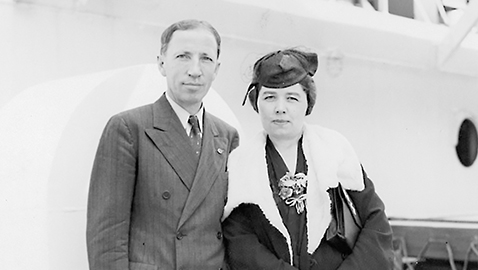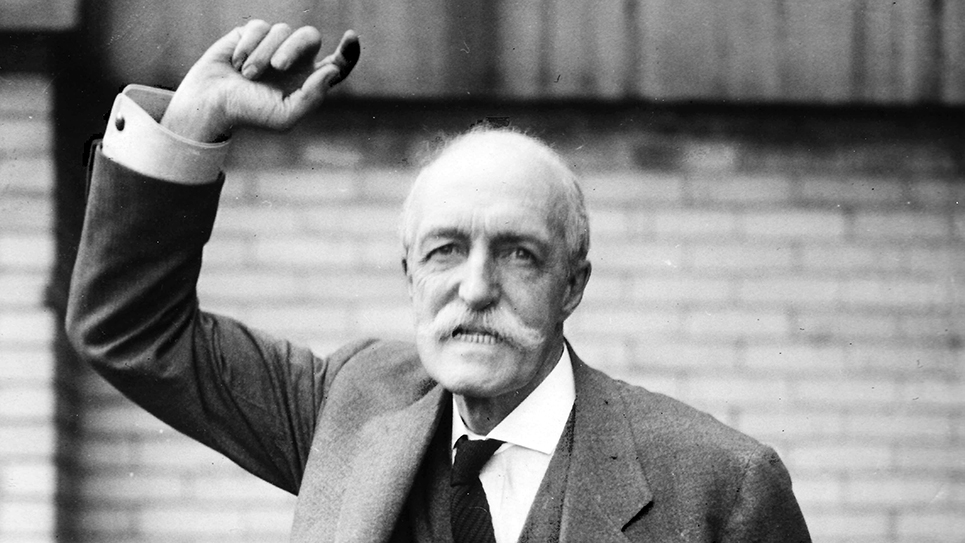By Ray Hill
Brazilla Carroll Reece had served Tennessee’s First Congressional District in Congress for ten years before losing the 1930 general election to Independent candidate Oscar Byrd Lovette. It was the first time in 52 years any candidate aside from a Republican had won a seat in Congress from the First Congressional District. Carroll Reece’s defeat was all the more astonishing considering O. B. Lovette’s campaign was organized and run in the last two weeks of the general election. Reece had lost reelection largely on one issue: government operation of Muscle Shoals (the forerunner of the Tennessee Valley Authority). President Herbert Hoover had vetoed the Muscle Shoals Bill and Congressman Reece caught hell from many of his constituents and he also received a pummeling due to the failure of the Cove Creek Dam to be built.
Following his defeat, Carroll Reece issued a statement conceding the election and congratulating his opponent, yet the congressman all but announced his intent to wage a comeback. Before his term of office expired, Reece appointed French Wampler, Jr., who had been born in Fountain City, to the U. S. Naval Academy. The Johnson City Chronicle carried a story about the 17 year-old having passed the mental examination required for entrance into the Naval Academy. The lad was the son of the Reverend and Mrs. French Wampler. The Chronicle noted, French Wampler, Jr. was “a nephew, on his mother’s side, ten generations removed, of Admiral John Paul Jones, of Revolutionary fame.”
The former congressman was also responsible for the appointment of Mark Hattan of Erwin, Tennessee to the Naval Academy. Reece was given the credit for having nominated young Hattan, a student at the Marion Military Institute, when the young man was notified he had passed the entrance exam. The Johnson City Chronicle noted, “Usually only thirty per cent of boys taking these rigid tests pass successfully.”
In August of 1931, Paul Havely wrote a column speculating on the 1932 elections for the Knoxville Journal. Havely wrote the Reece organization was already forming in anticipation of the election. Incumbent O. B. Lovette was expected to run inside the Republican primary rather than as an Independent in the general election. Paul Havely thought U. S. Attorney William J. Carter might also enter the GOP primary. Certainly Carroll Reece’s decade of service as a Republican member of Congress gave the former congressman a significant advantage, especially with the Hoover administration. Even though he had always been a Republican, O. B. Lovette had to be at least somewhat alienated from the Hoover administration as he was ignored in patronage matters and the numerous small courtesies normally rendered to an incumbent congressman. When William N. Doak, Secretary of Labor, came to Johnson City to speak at a Labor Day celebration, it was in response to an invitation from Carroll Reece, not Congressman Lovette. It was also Carroll Reece who introduced Secretary Doak to the crowd on Labor Day. The Secretary and Mrs. Doak joined the Reeces and their friends at a private luncheon at Bois d’Ormont, the Reece estate in Johnson City.
Former congressman Carroll Reece also got the credit for the expansion of the National Soldiers’ Home in Johnson City by the Chronicle when the Veteran’s Administration announced it was accepting bids to add 100 beds to the hospital portion of the facility, while adding 165 beds to the barracks.
Reece was also responsible for helping Bert Lowe, nephew of John Lowe of Erwin, Tennessee, the head of the local Brotherhood of Locomotive Engineers, get a position with the U. S. Department of Labor. The position paid $3,000 and according Elizabethton Star, young Bert Lowe had “many friends in Elizabethton and Carter county.”
After leaving office March 3, 1931, Carroll Reece kept his hand in political affairs and the Knoxville Journal reported the former congressman was one of those who had passed the Bar exam that summer. Reece was also the keynote speaker at the Watauga Academy Alumni Association meeting in the former congressman’s hometown of Butler in May. The banquet was held in the dining room of the girls’ dormitory and was decorated in the colors of the senior class: pink and white. Around sixty guests attended and were served “a delicious four-course dinner” by the junior class. Former congressman Carroll Reece spoke on the topic of “Success” and told his listeners, “Practically every successful man could look back in his life to having attended either a Christian high school or college and point out the influence on his life.” In the May 7 edition of the Knoxville Journal, the newspapers reported Carroll Reece was in Dandridge calling on citizens and stated, “It is understood that Mr. Reece will make the race for the Republican nomination for the office of Congressman next year.”
Members of the Elks Club in Johnson City heard Carroll Reece give a tribute to mothers that spring. Even though he was out of office, Reece’s doings as well as his comings-and-goings were still news. When the former congressman went to Elizabethton to visit his brother, it was duly reported by the local newspaper.
While credit and political capital accrued to former congressman Carroll Reece inside the First Congressional District, incumbent Congressman O. B. Lovette and his friends were not idle. The friends of Congressman Lovette hosted a dinner for him in his home city of Greeneville and urged that he announce his candidacy for reelection to Congress. Lovette told his friends he felt ready to enter the GOP primary the following year.
Hubert Brooks, who was the mayor of Johnson City as well as a Republican member of the Tennessee House of Representatives, was an ardent supporter of former congressman Carroll Reece. Brooks opined Reece’s defeat in 1930 was less the voters expressing dissatisfaction with the congressman than President Hoover. Mayor Brooks also believed Reece would run for Congress again in 1932 and oust Congressman O. B. Lovette. It was hardly a secret Carroll Reece was running to reclaim his seat in Congress, but merely a reminder to keep the former congressman’s name before the public. Still, no officeholder is universally loved and Carroll Reece was no exception. A local Johnson City druggist, Bernice C. Hall, disagreed with the assessment of Mayor Brooks. Hall had fired off an angry letter bitterly denouncing the mayor and emphatically stated it was his opinion Congressman O. B. Lovette would beat Carroll Reece for the GOP nomination if they tangled once again in 1932. In spite of the obvious favoritism of the Hoover administration toward Carroll Reece, Hall pointed out Congressman Lovette had pledged his full support for the President. Nor did Bernice C. Hall believe Carroll Reece had done a good job while in Congress. Hall believed Mayor Brooks and other supporters of Reece “are trying to drag the President into the coming congressional campaign by having this statement printed with a view to mailing same to the President for the purpose of prejudicing him against the present congressman.” Hall must have been quite the optimist; there was every reason to believe and plenty of evidence to indicate the Hoover administration was already prejudiced against O. B. Lovette. The Bristol Herald Courier acknowledged as much in an editorial comparing Reece and Congressman Lovette. The Herald Courier pointed out appointments made by the Hoover administration always seem to reflect a preference for those individuals recommended by Carroll Reece, not Congressman O. B. Lovette. “General Lovette stated shortly after his election that he was a Republican and that he would stand with the Republicans in the House, but he does not seem to be the kind of Republican the White House admires,” the Bristol Herald Courier said in an editorial. The Knoxville News Sentinel published an editorial that was also reprinted by the Bristol News Bulletin. The News Sentinel editorial was entitled, “Mr. Lovette Gets a Raw Deal.” The News Sentinel was chagrined President Hoover had nominated four postmasters inside the First Congressional District, all of whom were recommended by Carroll Reece. None of the persons recommended to the White House to serve as postmaster by Congressman Oscar Byrd Lovette had evidently received the slightest consideration. The News Sentinel defended O. B. Lovette, saying while he had run as an Independent in the 1930 general election, everybody knew he had been a life-long Republican. The News Sentinel fumed the GOP leadership had needed Lovette’s vote to barely retain the speakership of the House, yet ignored him completely in patronage matters. O. B. Lovette’s crime, the News Sentinel thundered, was he had beaten “one of the President’s pet congressmen and in doing so pledged himself to seek governmental construction of Cove Creek dam and Government operation of East Tennessee waterpower projects.” The News Sentinel reminded its readers of the letter penned by President Herbert Hoover during the 1930 GOP primary when Carroll Reece had defeated attorney Sam W. Price. The News Sentinel warned the President’s “new interference into First District political affairs doubtless will not set well with a lot of the voters who indicated their displeasure by unseating Reece from Congress.” The News Sentinel noted Hoover was “already none too popular in these parts” and believed there was still lingering resentment on the part of many voters or the presidential veto of the Cove Creek dam bill.
It was a fair point and a rather accurate assessment of the attitude of the Hoover White House toward O. B. Lovette.
For the remainder of 1931, Carroll Reece continued moving around the First District as if he had never left office.
Later that fall, William Isaac Giles, who had run for Congress as an Independent in the 1930 general election, was murdered. The sixty-eight year-old Giles, something of an eccentric, had been pulled off his horse, robbed, and beaten to death. William Isaac Giles was a perennial candidate for Congress and had stumbled to the home he shared with Sam Wilson and asked for a drink of water before falling over dead. “They jerked me off my horse,” Giles managed to gasp before dying. An autopsy was performed on Giles, which revealed his skull had been fractured. The dead man’s horse was found a quarter of a mile from his home and groceries, which Giles had purchased in Johnson City, were littered on the road. Giles was believed to have had $80 on his person when he left to pick up groceries; it was a large sum for the time, roughly the equivalent to $800 today and a princely sum in the midst of the Great Depression. William Isaac Giles had polled 7,636 votes to 28,142 for Carroll Reece in the 1928 election. A twenty-five year-old man, found with blood on his clothes, was arrested for the brutal murder of Giles.
The Sunday, January 10, 1932, edition of the Knoxville Journal carried the headline “Carroll Reece To Make Race”, noting the former congressman “Accepts Call of His Party In First District.” According to the Journal at least 1,200 Republicans from Tennessee’s First Congressional District gathered in Morristown to urge Reece to run once again for Congress. The group passed a resolution, which was signed by GOP leaders in every county comprising the First District, demanding “Reece again become our standard bearer, to take up the fight and battle with the foe.” The resolution promised the support of all signing the document, as well as those approving it. The delegates pledged to work hard in “reasserting the supremacy of the Republican party in our First district of Tennessee.”
Carroll Reece spoke briefly, telling his supporters, “In yielding to your request I pledge myself again to represent the people of the First district at all times. I am satisfied that I have served my friends when the opportunity presented itself and I have always had the thoughts and wishes of my people at heart.”
Carroll Reece had begun his march to return to the halls of Congress.






